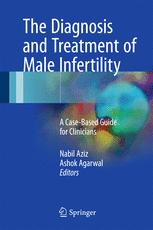

Most ebook files are in PDF format, so you can easily read them using various software such as Foxit Reader or directly on the Google Chrome browser.
Some ebook files are released by publishers in other formats such as .awz, .mobi, .epub, .fb2, etc. You may need to install specific software to read these formats on mobile/PC, such as Calibre.
Please read the tutorial at this link: https://ebookbell.com/faq
We offer FREE conversion to the popular formats you request; however, this may take some time. Therefore, right after payment, please email us, and we will try to provide the service as quickly as possible.
For some exceptional file formats or broken links (if any), please refrain from opening any disputes. Instead, email us first, and we will try to assist within a maximum of 6 hours.
EbookBell Team

4.7
16 reviewsThis case-based guide is written from the clinician's perspective, dealing with a defined male infertility problem, tracing the actual clinical pathway arriving at the diagnosis, and discussing the treatment options and the likely outcome. Rather than focusing on excessive theoretical details, each chapter presents a unique clinical vignette or scenario, the relevant aspects of which are followed throughout the entire chapter, correlating specific fertility issues with clinical findings, describing treatment options, prognoses and procedures (when indicated), and concluding with practical clinical pearls. Opening with chapters describing current diagnoses of male infertility and semen analysis, the subsequent cases presented cover a variety of relevant topics in male infertility, including anabolic steroid use, ejaculatory and erectile dysfunction, azoospermia, Klinefelter Syndrome, varicocele, cystic fibrosis and spinal cord injury. Additional chapters discuss choosing the right assisted conception technique and developing and managing a sperm bank.
Practical and illustrative of a wide array of male fertility issues, The Diagnosis and Treatment of Male Infertility is a go-to resource for clinical andrologists, reproductive endocrinologists, urologists, primary care physicians and any professional working to treat the infertile male.